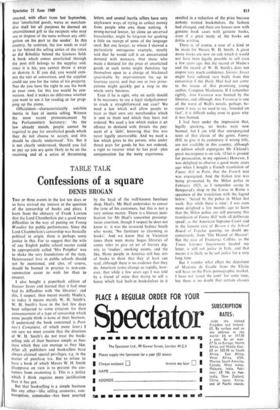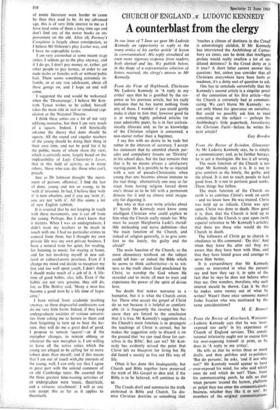Confessions of a square
TABLE TALK DENIS BROGAN
Two or three events in the last ten days or so have revived my interest in the question of the censorship of books and plays. I learn from the obituary of Frank Lawton that the Lord Chamberlain put a good many difficulties in the way of putting on Young Woodley for public performance. Since the Lord Chamberlain's censorship was basically political in origin, there is perhaps some justice in this. For to suggest that the wife of any English public school master could be appropriately called 'Mrs Potiphar' was to shake the very foundations of the state. Heterosexual love in public schools should not be mentioned, and also, of course, should be banned in practice (a non-con- summation easier to wish for than to ensure).
I also bought a paperback edition of Sinister Street and learned that it had once had its difficulties with 'the libraries', and this, I suspect, then meant mainly Mudie's, as today it means mainly W. H. Smith's. W. H. Smith's have in the last few days been subjected to some criticism for their announcement of a type of censorship which some people think is none of their business. (I understand the book concerned is Port- noy's Complaint, of which more later.) I am sure we must assume that the directors of W. H. Smith's do not treat the book- selling side of their business simply as bus- iness which they can manage as they like. After all, publishers and booksellers have always claimed special privileges, e.g. in the matter of purchase tax. But to refuse to have a book of which Messrs W. H. Smith disapprove on view is to prevent the cus- tomers from examining it. This is a policy which I think requires more justification than it has got.
But that bookselling is a simple business like any other—like selling cosmetics, con- traceptives, commodes—has been asserted
by the head of the well-known furniture shop, Heal's. Mr Heal undertakes to censor the taste of his customers, but this is not a very serious matter. There is a literary justi- fication for Mr Heal's somewhat presump- tuous assertion, though I suspect he does not know it: it was the reverend Sydney Smith who wrote, `No furniture so charming as books'. And we know that in Victorian times there were many bogus libraries of comic titles to give an air of literary dig- nity to 'studies', smoking rooms, and the like. Many people in America still buy sets of books to show that they at least can read, although there is no evidence that they do. American tastes change so rapidly, how- ever, that while a few years ago I was told by a friend of mine that trying to sell a house which had built-in bookshelves in it resulted in a reduction of the price because nobody wanted bookshelves, the fashion had changed, and there are houses now with genuine book cases with genuine books, even if a great many of the books are biblia a-biblia.
There is, of course, a case of a kind to be made for Messrs W. H. Smith. A great many books are now on sale which it would not have been legally possible to sell even a few years ago. But the record of Mudie's and the record of W. H. Smith's does not inspire very much confidence. Sinister Street might have suffered very badly from this censorship if the Daily Mail had not come to the rescue of that promising young author, Compton Mackenzie. if 1 remember rightly, Ann Veronica was banned by the libraries, and although Ann Veronica is one of the worst of Well's novels, perhaps be- cause it was, as we used to say, 'founded on fact', it is difficult today even to guess why it was banned.
I had been under the impression that, legally speaking, no books were now banned, but I am told that unexpurgated texts of that classic of the genre, Fanny Hill, to give it its customary if wrong title, are not available in this country, although an edition which expurgates Mr Cleland's great masterpiece is on sale. (That is ground for prosecution, in my opinion.) However, I was delighted to observe a good many years ago when 1 bought a French translation of Fanny Hill in Paris, that the French text was expurgated. And the Italian text was being prosecuted by the Milan police in February 1923, as I remember seeing in Bemporad's shop in the Corso in Rome a specimen of the translation with the legend below: 'Seized by the police in Milan last week. Buy while there is time'. I was even more delighted a few months ago to learn that the Milan police are still pursuing this translation of Fanny Hill 'with all deliberate speed', as the American Supreme Court said in the famous case of Brown v the School Board of Topeka. quoting, no doubt un- consciously, from 'The Hound of Heaven'. But the case of Francesca Collina. as the Times Literary Supplement headed my letter, is still sub judice in Italy, and that means it is likely to be sub judice for a very long time.
But 1 wonder what effect the departure of Madame de Gaulle from the Elysee will have on the Paris pornographic market. I have not 'cased the joint' for some time, but there is no doubt that certain classics of erotic literature were harder to come by than they used to be. At my advanced age, this is of very little interest to me as I have read some of them a long time ago and don't find any of the newer books an im- provement on the old. After all, Portnoy's Complaint is largely about constipation, as I believe Mr Osborne's play Luther was, and I have no coprophilic tastes.
I am very astonished at some recent stage antics. I seldom go to the play anyway, and if I do go, I don't pay money or, rather, get other people to pay money, in order to see nude males or females with or without'pubic hair. There seems something extremely in- fantile, or at any rate adolescent, about all these goings on, and I hope an end will come.
I suggested the end would be welcomed when the 'Dramaturge', I believe Mr Ken- neth Tynan wishes to be called, himself takes the main role in real or simulated cop- ulation at the National Theatre.
I think these antics are a lot of not very edifying nonsense, but then I am very much of a square. Indeed, I will heretically advance the theory that dons should be square. All the round and angular teachers of the young should be doing their thing in their own time, and not be paid for it by the public, many of whom share the view, which is certainly mine, largely based on the implausibility of Lady Chatterley's Lover, that in this field of activity, as in many others, 'those who can, do; those who can't, preach.
Just as Dr Johnson thought 'the merri- ment of parsons offensive', I find the lust of dons, young and not so young, to be 'with it' tiresome. In fact, I believe that 'with it' is now obsolete, and if you say."..with it', you are not 'with it'. All this seems a lot of new English rubbish.
It is asserted that by not keeping in touch with these movements, one is cut off from the young. Perhaps. But I don't know that it matters. When I was an undergraduate, I didn't want my teachers to be much in touch with me. I had no particular crimes to conceal from them, but I thought my own private life was my own private business: I have a natural taste for quiet, for reading, for listening to music, for staying at home, and for not involving myself in new cul- tural or cultural-erotic practices. Even if I change my mind and decide to recapture my lost and too well spent youth, I don't think I should make much of a job of it. A life- time of good habits, alas, tells. Even if the habits are not very genuine, they still do, for, as Elie Halevy said, 'Many a man has become a good man by a life time of hypo- crisy.'
I have retired from academic teaching anyway, so these disgraceful confessions can do me very little harm. Indeed, if they keep undergraduate societies of various universi- ties from asking me to lecture to them and then forgetting to turn up to hear the lec- ture, they will do me a great deal of good. I propose to remain 'square'—or- if the metaphor changes, to remain oblong or whatever the new metaphor is. I am willing to leave all the active antics which the young are alleged to be calling for to more robust dons than myself; and if this means that I am out of touch with0the interests of the young, well, I can only say that I agree in great part with the unkind comment of an old Cambridge tutor. He asserted that the three greatest time-wasting activities of an undergradute were 'music, theatricals, and a virtuous attachment'. I will at any rate accept this as far as it applies to theatricals.







































 Previous page
Previous page